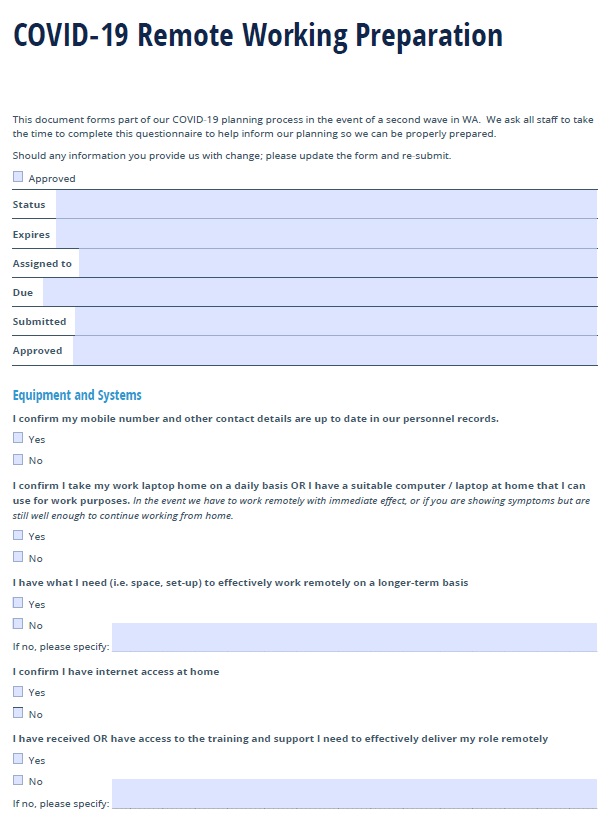During a snap lockdown, businesses are forced to answer the question - are you prepared to move to remote work overnight?
CCIWA outlines the key actions you should take.
1. Review continuity planning
Now is the time to fine tune your business continuity plan, keeping in mind that a future lockdown is likely to look different to previous COVID-19 restrictions.
Consider whether you have the technology and communications plan in place to support your business through different scenarios.
Ensure all staff:
- know what their role is in the case of lockdown;
- have what they need to work remotely (i.e. systems and equipment) where their role permits remote working; and
- understand the processes and procedures for moving to remote working.
You will also need to review supply chain vulnerability, and any issues, concerns or feedback from customers or clients.
2. Learn from experience
Take some time to work through what did, and did not, work during previous periods of remote working and other COVID-19 restrictions.
It is important to understand not only your business response when it comes to COVID-19 and associated restrictions, but to also consider the physical and psychological impacts on staff.
Gathering feedback from staff is critical to this process as is updating information such as:
- - employees’ contact details (for efficient contact in the event of immediate lockdown);
- - remote working equipment and systems requirements;
- - employees’ remote working environment (i.e. updating ergonomics and safety checklists);
- - confirming which staff are at a higher risk of developing serious illness from COVID-19, or are living with someone who is.
A useful template for gathering key information from staff in preparation for remote working can be found here.
3. Assess risks
A new lockdown could look different to previous COVID-19 restrictions. This could mean a different level of anxiety within the community, less flexibility, support or leave options for people with caring responsibilities, for example.
The psychological impact and effect on employee mental health and wellbeing of subsequent lockdowns may be more significant than in the past, so it is crucial for workplaces to have the right measures in place to respond to such issues.
Employers should also consider the potential risk of family and domestic violence for a remote workforce, ensuring a clear policy and procedure is in place to support staff experiencing F&DV and, wherever reasonably practical, providing options for working in-office or away from an environment where staff may be at heightened risk of F&DV.
It will be important to review processes, identify gaps and prepare for the health and safety requirements around remote working in the future. Having the right policies and procedures in place as well as a clear hazard and incident reporting procedure are good starting points.
CCIWA’s work from home pack on its COVID-19 site contains some best practice guidelines to enable a smooth transition to remote working.
4. Analyse skill requirements
In some cases, cross-training or upskilling employees may help your business run more efficiently in the case of a lockdown.
Use the lessons learned from the previous lockdown to determine which areas of your business were most and least utilised. Consider, if there was a future lockdown, if the impact would be similar on operations and then:
- Process map tasks in areas likely to require additional resourcing during future lockdowns.
- Arrange training/coaching/ job-shadowing while not in lockdown to support reallocation of work in the event of future lockdowns.
This will help keep staff engaged by developing new skills and provide greater flexibility to redeploy staff into other areas, if required, in the future.
There may be some contractual or industrial award considerations when requiring staff to undertake work tasks outside of their usual remit. CCIWA’s Employee Relations Advice Centre can support employers in understanding these obligations.
5. Review IT infrastructure
Recent lockdowns around the world have exposed the heightened cyber security risks for some businesses during remote working scenarios.
Ensure your IT systems are up-to-date and security measures are robust.
Train your staff on how to use the systems to their best advantage and how to spot potential cyber-crime.
6. Stay informed
Now is a more important time than ever to keep up-to-date with the latest advice on COVID-19 as it affects your business.
The State Government’s COVID-19 site is a useful resource, as well as CCIWA’s site.
For more information and advice about how to prepare your workplace for a snap lockdown, contact our Employee Relations Advice Centre on (08) 9365 7660 or [email protected].













